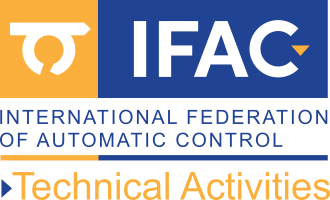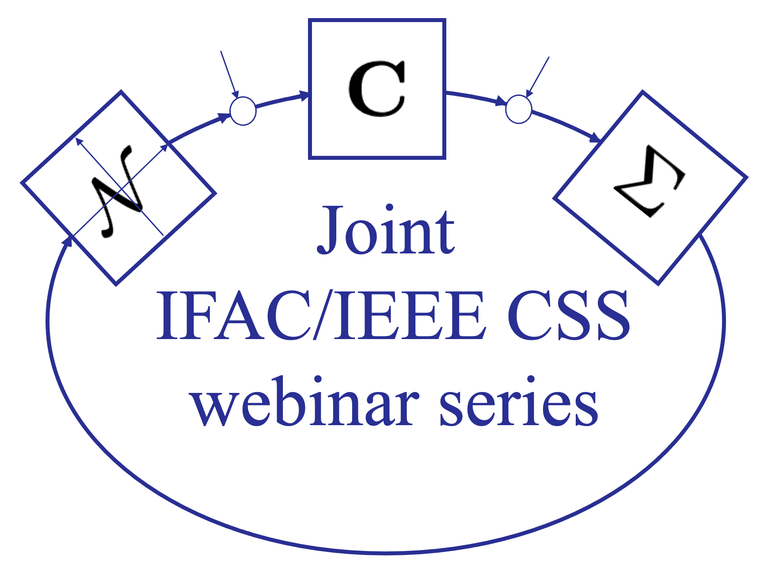Joint IFAC/IEEE CSS webinar series
The next webinar in this series will be given by Prof. Kirsten Morris, University of Waterloo, Canada.
Date: 10:00 am EDT / 3:00 pm Central Europe /11:00 pm Japan Time on Thursday, March 14.
Zoom: https://uniroma1.zoom.us/j/85794813444?pwd=WXZYQitGRWxKbTU4ZDd2YnR1d3Zwdz09
Live streaming on youtube: https://youtube.com/live/T1O0mYB-jKo?feature=share
The recorded session will be made available in the IFAC youtube channel: https://www.youtube.com/watch?v=JhW60e3yRlU
Title: Systems theory for partial differential-algebraic equations
Abstract: There are a number of applications which are modelled by partial differential-algebraic equations (PDAEs). One of practical importance is the electro-chemical model for lithium-ion cells. This model can be converted to a (nonlinear) PDE. This is not possible, or practical, in all cases. Establishing existence and uniqueness of the solutions to these equations, as well as continuous dependence on data is non-trivial. For linear systems, a decomposition of the state-space that leads to an extension of the Hille-Yosida Theorem is described. For dissipative partial differential equations the Lumer-Phillips generation theorem characterizes solvability and also boundedness of the associated dynamics. An extension of the Lumer-Phillips generation theorem to linear dissipative differential-algebraic equations is given. Examples of controller design strategies for these systems are also discussed.
The webinar is organized by Claudia Califano (vice-chair education of IFAC TC 2.3), Bayu Jayawardhana (vice-chair publication of IFAC TC 2.3), Hiroshi Ito (chair of IFAC TC 2.3 Non-linear Control Systems) and Andrea Serrani (chair of IEEE TC Nonlinear Systems and Control).
Past webinars:
- Prof. Murat Arcak, Professor of Electrical Engineering and Computer Sciences at University of California Berkeley.
- Title: Dissipativity Tools for Convergence to Nash Equilibria in Population Games
- Date: Thursday, February 17, 2022.
- Video: https://www.youtube.com/watch?v=S7mH-MBZYzY
- Prof. Jacquelien Scherpen, Professor of Faculty of Science and Engineering at University of Groningen.
- Title: Krasovskii Passivity, Control Methods and Applications to Switching Circuits
- Date: Thursday, March 17, 2022.
- Video: https://www.youtube.com/watch?app=desktop&v;=fclsOlDNVMY
- Prof. Dragan Nesic, Professor at Department of Electrical and Electronic Engineering, The University of Melbourne, Australia.
- Title: Stability and near-optimality for dynamical systems controlled via Value Iteration
- Date: Thursday, April 14, 2022.
- Video1: https://www.youtube.com/watch?v=St9HmGq1syQ
- Video2 with the slides: https://tc.ifac-control.org/2/3/slides_nesic.mp4/view
- Prof. Anders Rantzer, Professor at Automatic Control, Lund University, Sweden.
- Title: Nonlinear Optimal Control for Large-scale and Adaptive Systems
- Date: Wednesday, June 15, 2022.
- Video: https://www.youtube.com/watch?v=qX4OGsmzqX4&list;=PLLhem8_dLoaplspC5EjpThZHrpXH80gys
- Prof. Miroslav Krstic, Distinguished Professor of Mechanical and Aerospace Engineering, UC San Diego, USA.
- Title: Inverse Optimal Safe Control
- Date: Thursday, October 13, 2022.
- Video: https://www.youtube.com/watch?v=s4f2nOrKlIA&list;=PLLhem8_dLoaplspC5EjpThZHrpXH80gys&index;=1
- Prof. Dr.-Ing. Frank Allgöwer, University of Stuttgart, Germany.
- Title: Data-driven MPC: From linear to nonlinear systems with guarantees
- Date: Thursday, November 3, 2022.
- Video: https://www.youtube.com/watch?v=9GP1dmj58cw
- Prof. Toshiyuki Ohtsuka, Kyoto University, Japan.
- Title: Real-Time Optimization Algorithms for Nonlinear Model Predictive Control of Nonsmooth Dynamical Systems
- Date: Tuesday, November 22, 2022.
- Video: https://www.youtube.com/watch?v=7jCnOgu0tVA
- Prof. Rodolphe Sepulchre, Rodolphe Sepulchre, BE/UK.
- Title: Nonlinear feedback analysis: back to the future
- Date: Thursday, January 26, 2023.
- Video: https://www.youtube.com/watch?v=KEAMy8yA-_0
- Prof. Arjan van der Schaft, University of Groningen, The Netherlands.
- Title: Port-Hamiltonian systems theory and monotonicity
- Date: Wednesday, March 15, 2023.
- Video: https://www.youtube.com/watch?v=sBKMFx6y41c
- Prof. Alessandro Astolfi, Imperial College London and University of Rome Tor Vergata, UK and Italy.
- Title: Pontryagin meets Bellman
- Date: Wednesday, June 28, 2023.
- Video: https://www.youtube.com/watch?v=ue-BkPE2dY0
- Prof. Hyungbo Shim, Seoul National University, Korea.
- Title: Coordination of heterogeneous multi-agent systems via blended dynamics theorem
- Date: Monday, February 26, 2024.
- Video: https://www.youtube.com/watch?v=Vj_vzt0T3cY
- Prof. Kirsten Morris, University of Waterloo, Canada.
- Title: Systems theory for partial differential-algebraic equations
- Date: Thursday, March 14, 2024.
- Video: https://www.youtube.com/watch?v=JhW60e3yRlU


